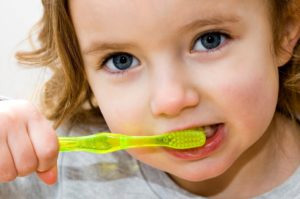
Brushing your teeth probably isn’t on the list of activities you enjoy, but you do it anyway. It’s easy for brushing and flossing to feel like chores, despite knowing their importance for your oral and general health. Adults aren’t the only ones to feel this way. Getting your child to brush their teeth can feel like a constant fight. Unfortunately, nagging or punishing them won’t improve their commitment to their dental health. Instead, your pediatric dentist in Greenfield recommends plenty of praise to change their opinion of oral hygiene to create habits that can last for a lifetime.
The Power of Praise
Admit it, you’ve probably skipped brushing your teeth a time or two before bed. Children aren’t any different. Some days, they just don’t want to brush their teeth. Research has found a lack of sleep, stress, and other factors can influence the fluctuation of brushing habits in children. If a child is scolded or punished for not brushing enough, it further adds negativity and stress.
According to Medical Xpress, the solution to changing a child’s perception of brushing can be as easy as saying, “good job!” They conducted a study with the University of Pennsylvania, Yale University, and the Sante Fe Institute, which found praise is more effective for improving brushing and flossing habits to make them less mundane as an adult.
Tips to Keep Brushing Fun
Besides giving plenty of daily praise, you can win the brushing battle using a few tips for children’s dental health:
- Pick a New Toothbrush: Children as young as 2 can use an electric toothbrush under supervision. Swapping from a manual can feel like an important rite of passage for children. There are endless options to choose from that will satisfy you and your child – from singing timers to pressure sensors. Your child will be excited to brush their teeth with the right toothbrush.
- Create an Award System: Create a sticker chart to track your child’s morning and nightly oral hygiene habits. After receiving enough stickers, have an award set up, like picking a small toy or a picnic at the park.
- Visit the Dentist Early: Early dental care is proven to encourage better oral health throughout life. Your child should see their pediatric dentist for the first time before turning 1 with semi-annual appointments from there on out. Your child will learn the dentist isn’t a scary place while also understanding the importance of keeping their smile clean and healthy.
If you feel like you’re losing an endless battle, try more encouragement and support to make a long-term impact on your little one’s smile.
About Dr. Marie Tremblay
Dr. Tremblay earned her dental degree at the University of Montreal before continuing her education at Tufts University, where she focused on pediatric dentistry. She is a Diplomate of the American Board of Pediatric Dentistry and an active member of the American Academy of Pediatric Dentistry. If it’s time for your child’s cleaning and checkup, contact our office today for an appointment.
